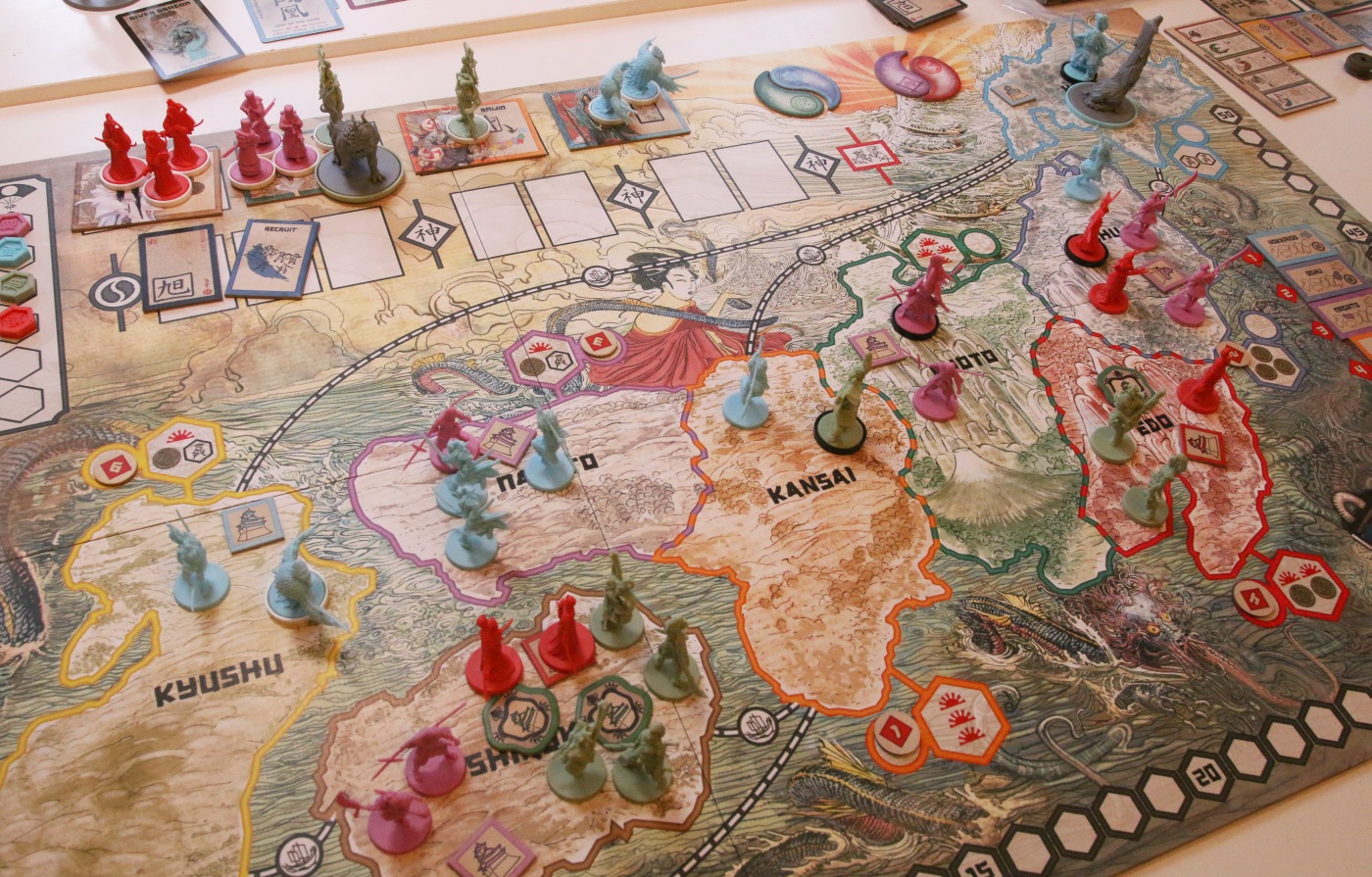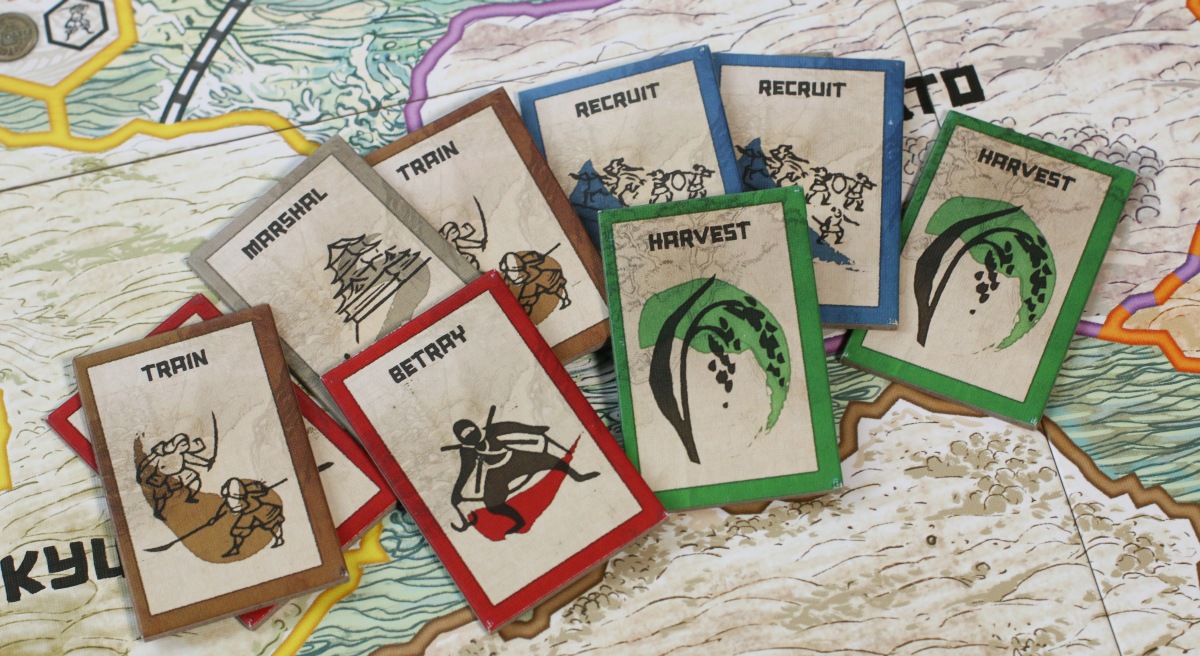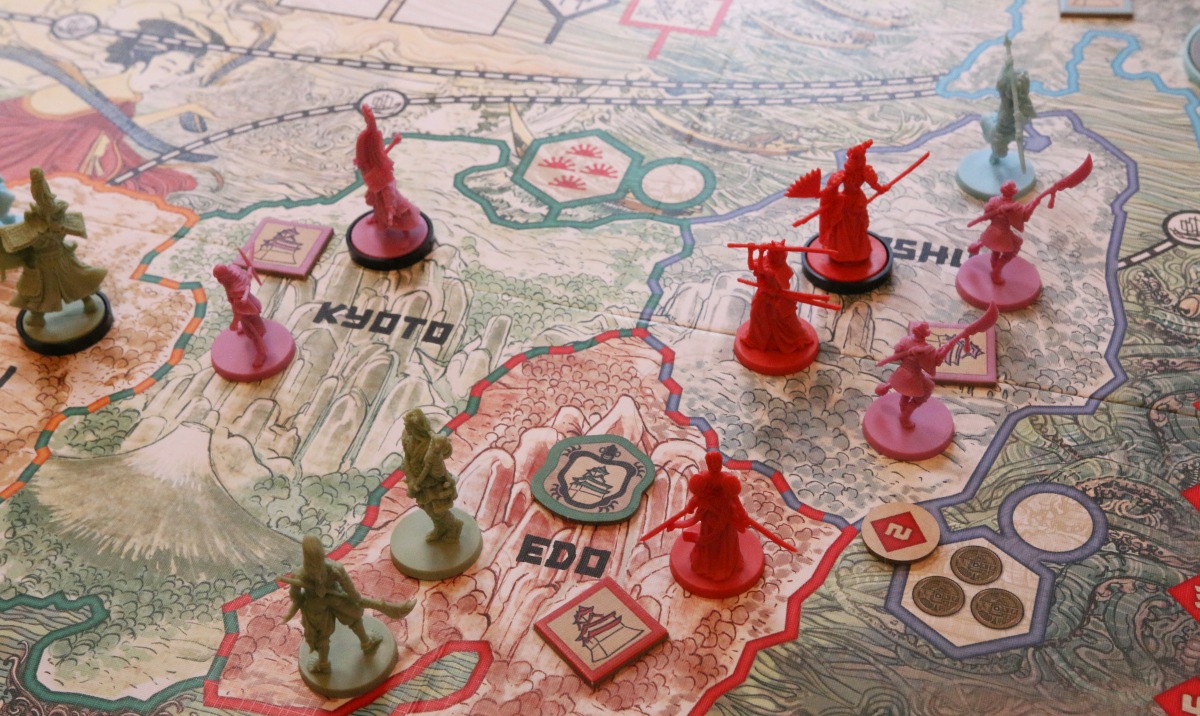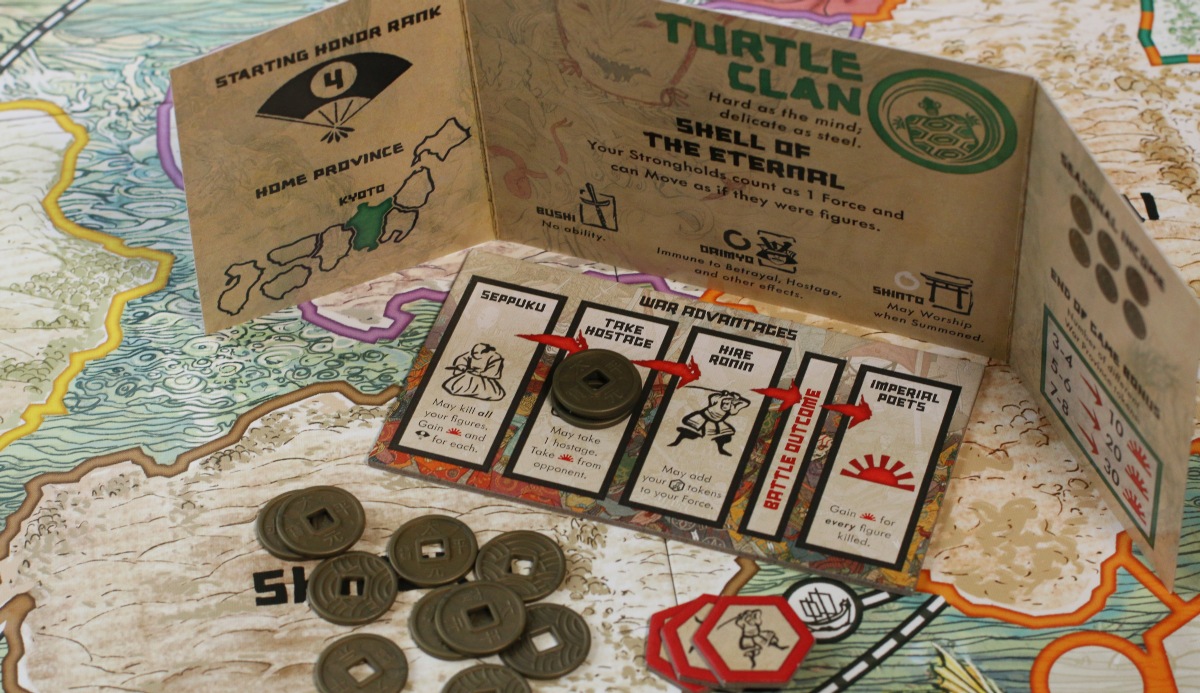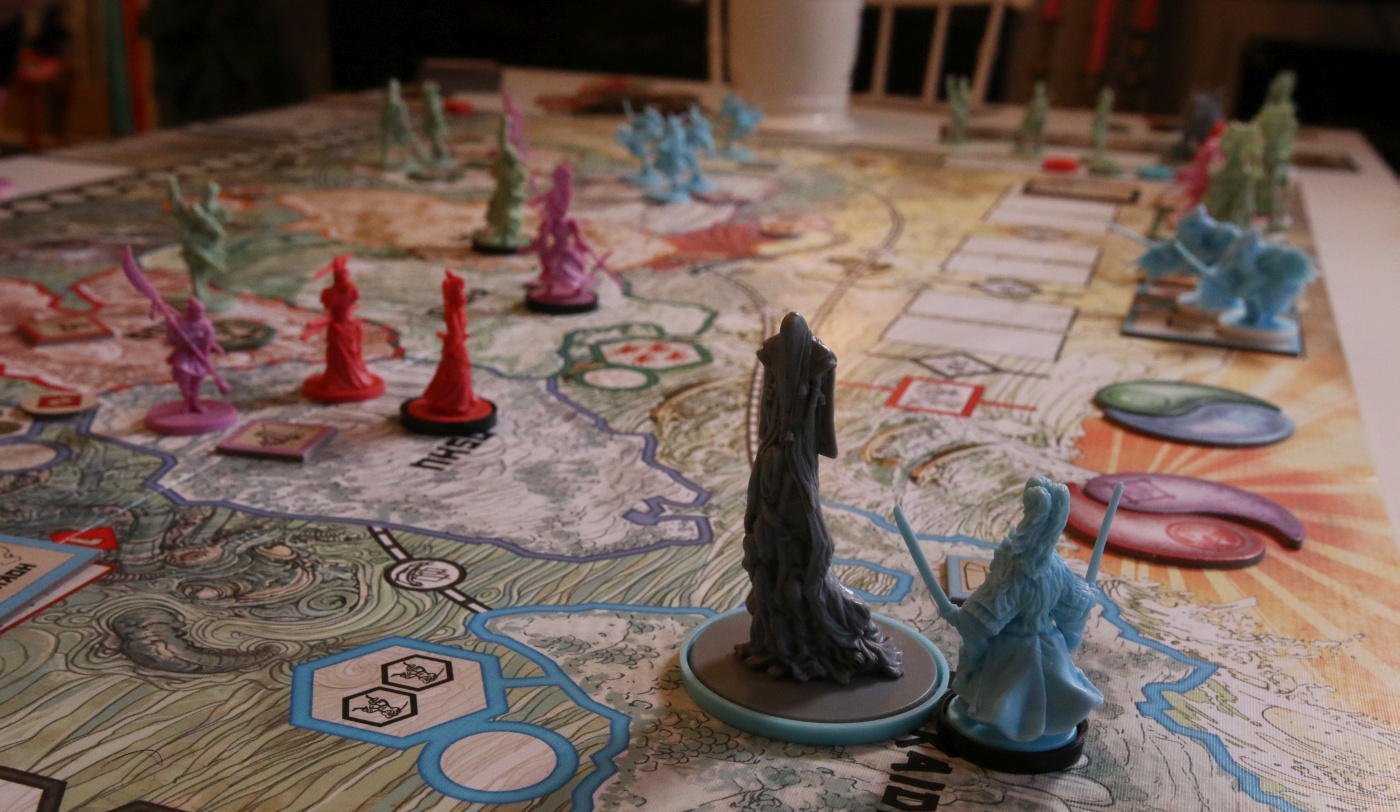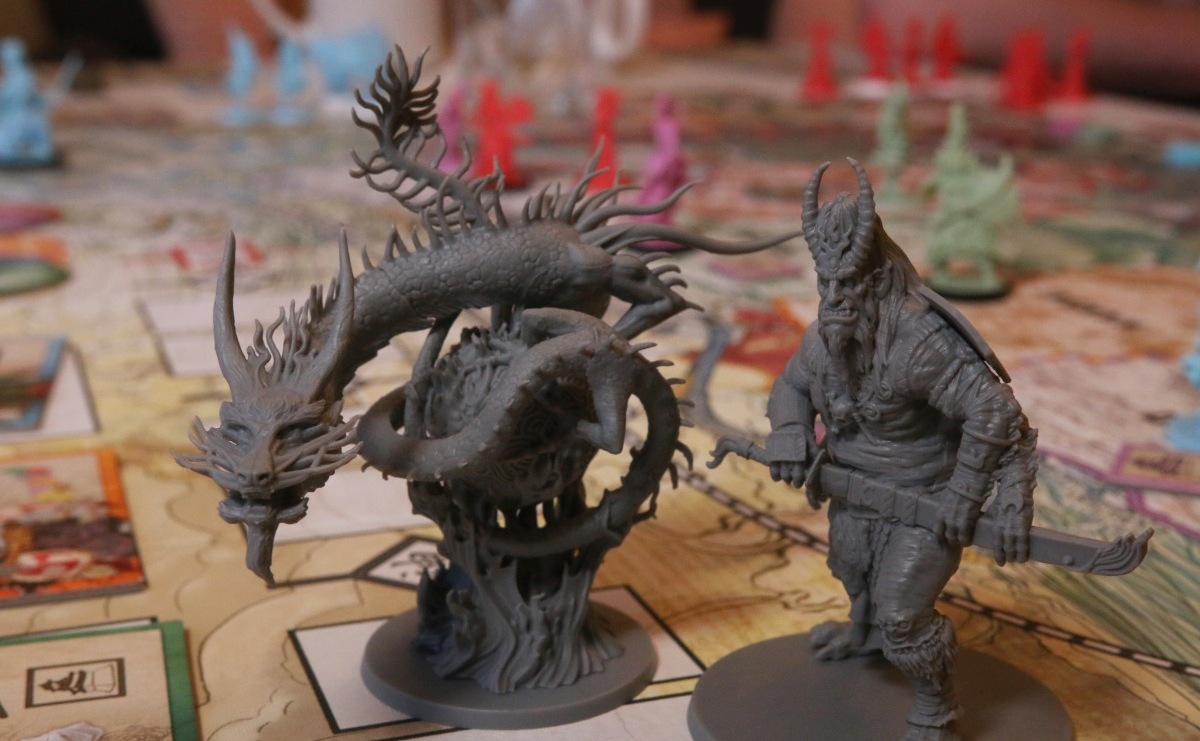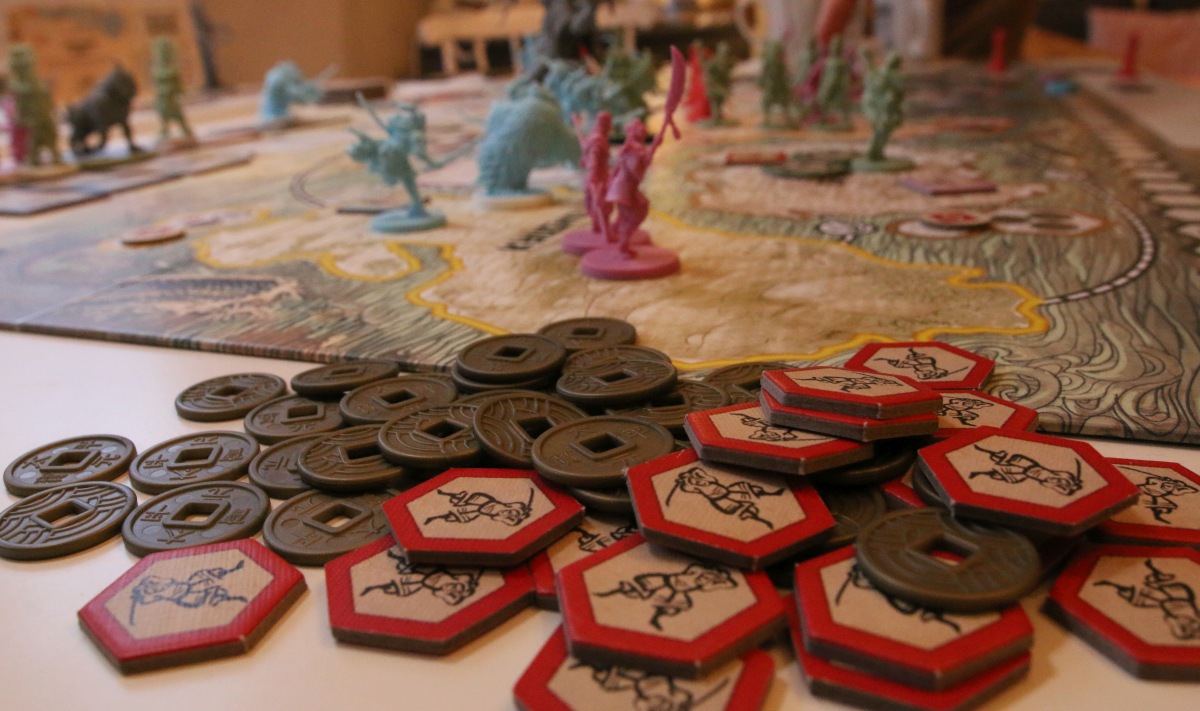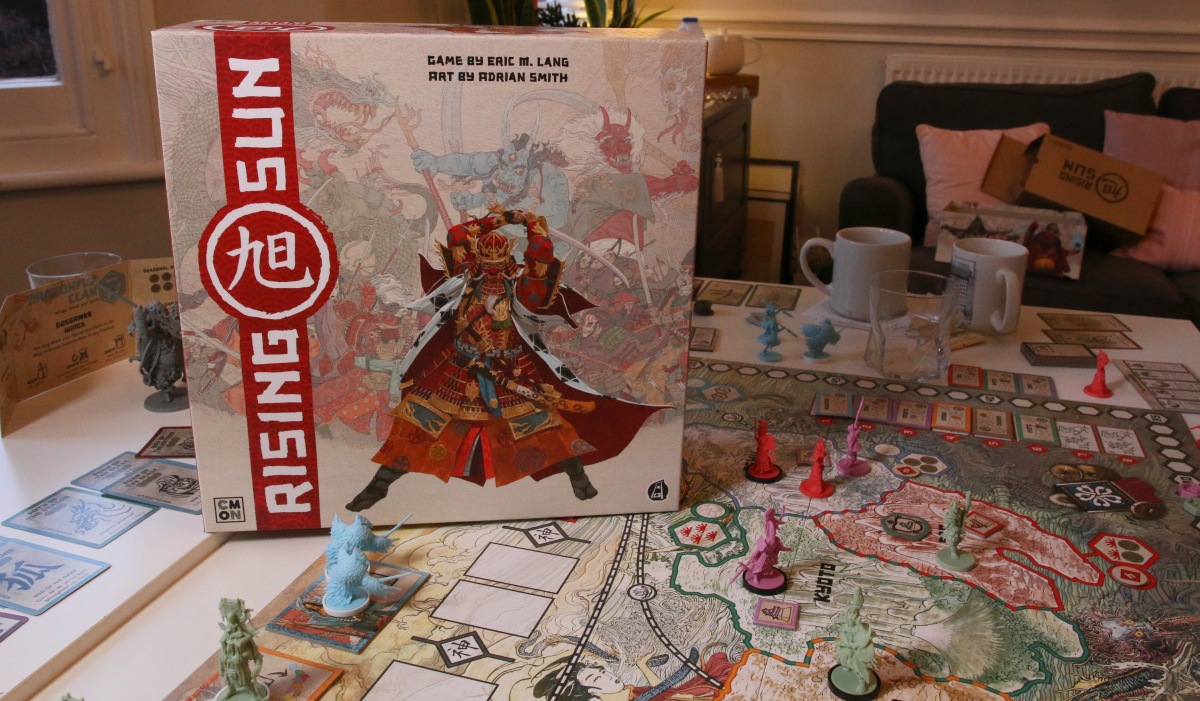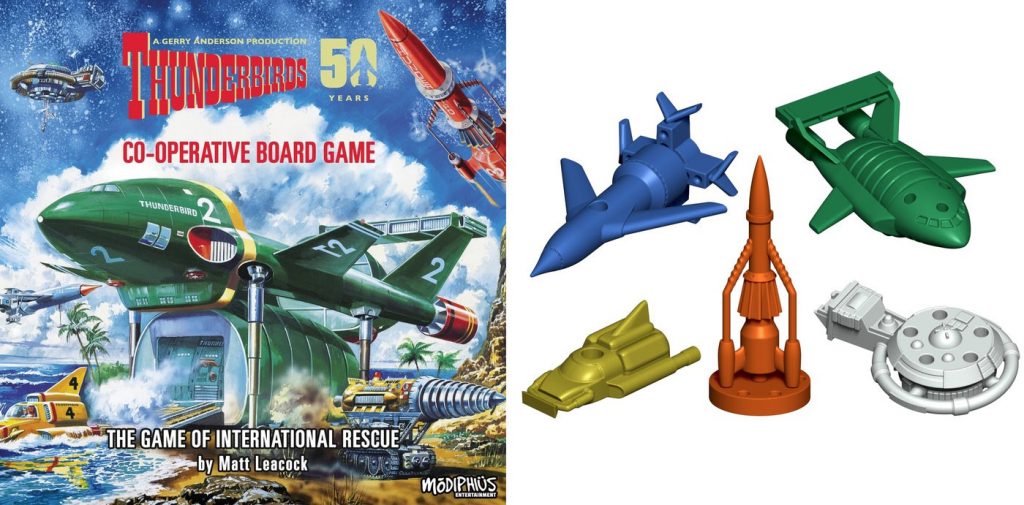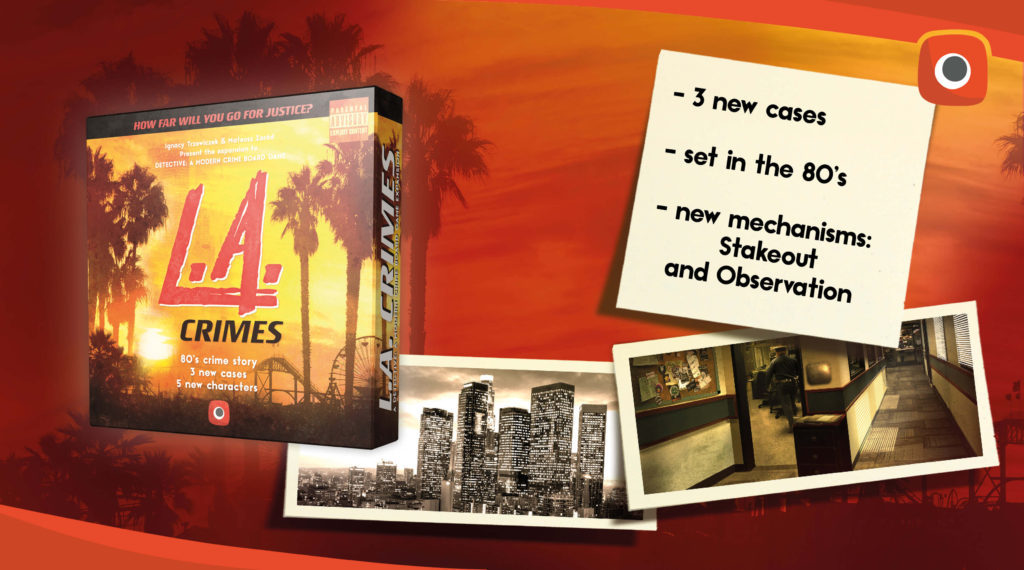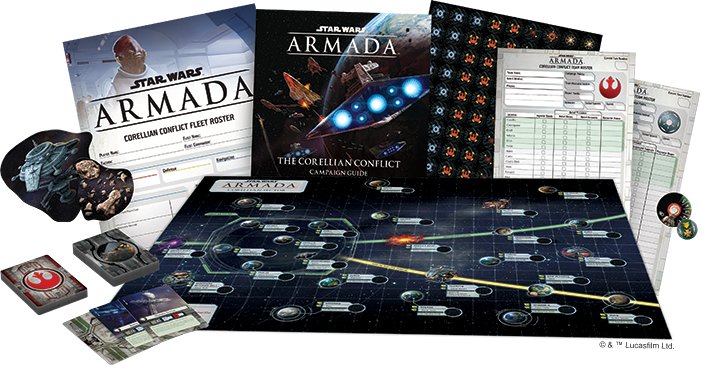Matt: Rising Sun is a big-box Kickstarter darling filled with frankly massive plastic things, with a hefty retail price of £75 / $80. Set in a god-powered version of feudal Japan, players act as one of six different clans vying for control of those lovely islands. But the plus-size map and plastic armies are slightly misleading: Rising Sun is not what it appears to be.
If you’re expecting a traditional game of nudging toy soldiers around a map, Rising Sun might leave players bored, confused, or quietly in a huff. But if you can get your head around what it is, and teach your friends what it is (and isn’t), Rising Sun can be really very good.
The game takes place over three rounds, each of which is made up of seven actions. On their turn players pick up the top 4 ‘Political Mandates’, seen below, from the shared chunky stack of ten, choose one of them to play, and then return the other three to the top of the stack.
Most of these actions affect all players: ‘Recruit’ adds new units to the map while ‘Marshal’ lets you move them around, but in both cases all other players must carry out this action before you do, giving you the tactical edge when making your decisions. At the start of each round pairs of players can also choose to unite in an alliance, and the advantages of this are HUGE. Almost all of the Political Mandates offer a hot hot bonus for the player choosing it as well as their ally.
As such, these teams get stuff done, and alliances only become more essential as you scale up the player count. When dividing up the seven actions in a four player game, one person will always find themselves only getting to pick one mandate that round. In a five player game? Only two players will get more than one action, putting them in a uniquely strong position for negotiating. This cycle of mild imbalance is essential for sparking the game’s political side into life, to the point that Rising Sun can feel a bit limp when only played with three people.
For a game in which you’ll frequently find that none of the four mandates you’ve drawn will allow you to do the thing you want to do, it’s crucial that the alliance system is as rigidly mechanical as it is: alliances can only be created at the very start of each round, and the only way to betray your ally is by playing the official BETRAY power. As in real life, betrayal offers perks – but choosing this mandate takes up a whole turn, making it less of an unexpected knife in the back and more an ambivalent divorce. Occasionally subterfuge will be something you’ve planned, but mostly it happens because you’ve nothing better to do in that moment. It’s the game design equivalent of a Pulp song, with players languidly sleeping around and cheating on one another because you’re all cut from the same tacky cloth.
(Except, y’know, less erotic.)
Your best bet for not being screwed over by your ally is to pick the player around the table with the least conflicting interests. Players in Rising Sun are encouraged to win fights in as many different locations as possible, a bit like children filling collectable sticker books. Once you’ve won a battle in Edo, it’s not a great use of your time to then do it again. You have your wild night of passion, but come the morning you’ll already be making plans for a quick exit out the back door, wondering which border you should slip across next (except still not erotic).
If there’s one element of Rising Sun that is sexy, it’s the fights themselves, which are a hot blend of deduction and bluffing. With no cards or secret powers the only real “gotchas” come from players who’ve tricked their opponent human-style.
Each player openly reveals how many coins and ronin tokens they currently have, and then shifts behind a screen to secretly assign coins to try and win the bid for four specific advantages. Like so:
The open nature of resources prior to bidding means it’s possible to be 100% certain of winning a battle, but only if you bid everything. If the other player knows that though, what’s to say they won’t low-ball or bid nothing, knowing you’re likely to blow all your coins? But then that means you should keep some coins back…
This vortex of double-bluffing gets swirlier and more exciting when you then introduce the rule that whilst all coins spent on bids must then be discarded, the winner’s coins are distributed evenly to those who lost the battle, who may then use those coins to bid in upcoming conflicts. Oh no!
The gentle chaos of Rising Sun’s combat is delightful: because you can see the specific order of the battles being fought at the end of each round, choosing when and how to spend coins on bidding adds a fuzzy strategic layer that genuinely pops. Poor players can suddenly find themselves drunk on cash, leaving a future opponent who expected a cakewalk nervously wondering if they can still win this fight. Because you can’t keep money between the game’s rounds, everyone at some point can be expected to splurge. When and where? That’s the question.
But despite the battles, this very much isn’t a war game. There’s no tangible sense of territory here – your units feel less like armies and more like violent tourists. There’s more of a sense of persistence on the Kami track at the top of the board where players can assign priests to gain regular boons from the gods throughout each round, but most of what you do feels faintly abstract. This aids the temporary alliance mechanics, but contributes to a tone in which very nowhere and no-one feels consequential.
You find this throughout Rising Sun. The things that feel like they should matter, don’t. If you’re able to pull it off, one of the most effective point-scoring battle strategies in the game is to roll your entire army into one place and have them all commit ritual suicide before the fight starts. The things you do that will win you the game don’t always make sense, and won’t always feel the most fun. The best upgrade cards to buy from the shop are usually the ones that straight-up give you points, and the amazing monsters are sometimes left standing there like the awkward kids picked last at gym class.
But buying points is boring, especially when you’ve also got the option to buy a massive plastic monster! Attempt to play Rising Sun with your heart and you’ll end up ruined: Monsters are no more or less powerful than any of the other cards in the shop, but they feel like they should be, and in a hobby as tactile and present as board games emotional responses count for a lot.
When you place a piece on the map that is twenty times heavier than a little warrior and almost fills some regions of Japan, the mechanics of the game should reflect that sense of power. Rising Sun’s don’t, making these figurines a fun boon for miniature enthusiasts but an uncomfortable compromise for the game’s design.
But then in general, this is a game that doesn’t feel like it cares too much the aesthetic that it wears like a skin: the art is a strange mashup of wildly different Japanese styles, and the flippant inclusion of Seppuku as a point-scoring mechanic feels thoughtless and vulgar.
The gaffe which led to one of the stretch-goal gods being named after a hairy man from New Zealand is unsurprising: Rising Sun revels in the coolness of the setting, but shows no real interest in engaging with it meaningfully, or even politely. Culturally it’s tone-deaf at best, which in turn fails the design: When you only showcase only the slightest interest in your game’s theme, it’s unlikely that said theme is going to help to immerse people once they’ve actually sat down to play.
Rising Sun’s hazy sense of self combined with temperamental player control and volatile board-states means that in our experience, some people just don’t click with it. Poor decisions in the early game can very easily leave you hobbled and hampered for the entire experience, poor decisions that might come from simply doing what feels “right” within the game’s chosen setting of warring clans.
The secret is, your best chance of winning is to spend the game peering down at the game’s various tracks and shops as if you were studying tea leaves, chasing the most deviant combos you can find.
And now that I’ve erected this fence of criticisms and caveats, I’m going to knock it down. There’s a lot I love about Rising Sun. Incomplete control makes negotiations genuinely important, but alliances being temporary means that betrayals don’t leave the game feeling sour. The Honor track is a lovely addition in which the game’s theme finds space to shine – the highest honor breaks all ties, but there are also a bunch of tempting ways to benefit from being a dishonorable twerp.
Hopping in and out of different alliances throughout the game provides an awesome amount of levity and humour, and the secret bidding phase that’s used to influence combat is both fun and fast – there’s very little space for analysis paralysis when you’re facing down some poker-faced opponent whose plans are a total mystery: it’s simply a case of deciding what victory is worth. Truly though, it’s the way these battles chain together that feels special, frequently leading to situations in 4 or 5 player games in which you spend every coin in your reserves on your last battle of the season, and in doing so then hand a fat stack of coins to the player who is just about to fight your ally. And they sort of just glare at you, horrified, and you emphatically smile and shrug but secretly you’re happy because you want them to lose so you can win.
And honestly, that’s board game magic. That’s what it’s all about!
Rising Sun is decent, but I don’t think it’s a game I can truly recommend. It’s an interesting experience that’s a little too awkward for our tastes, both in terms of offering an unforgiving puzzle in which some players can explode ahead whilst others fail to ever start their engine, but also because of its broad disinterest in engaging meaningfully with its own theme.
And the thing is, when you’re paying for something more expensive than almost any of the games we recommend, any problems at all become difficult to sideline. And when a chunk of what you’re spending your money on is massive plastic figurines that don’t integrate pleasingly with game’s design, Rising Sun becomes a game that feels compromised by its need to be marketable. On that basis alone, we feel compelled to point you in the direction of a series of games that are cheaper, work with broader player counts and are (we think) better.
First and foremost, check out Paul’s review of Battle for Rokugan, a game offering tricksy area control but with a price that’s almost a third of Rising Sun’s. If you want a big ol’ Japanese game of conquering territory, Shogun is a classic game that’s just packed with genius ideas. If you want the kind of messy miniatures combat that Rising Sun looks like it is (but isn’t), Kemet is a glorious and chaotic rumble. And if you specifically want a weird combination of drafting, area control and not-quite-combat but that’s thematically consistent, this site’s love of Inis is well-known. And you can’t mention Kemet and Inis without talking about Cyclades, can you?
Ah! Too many games, too little time.

